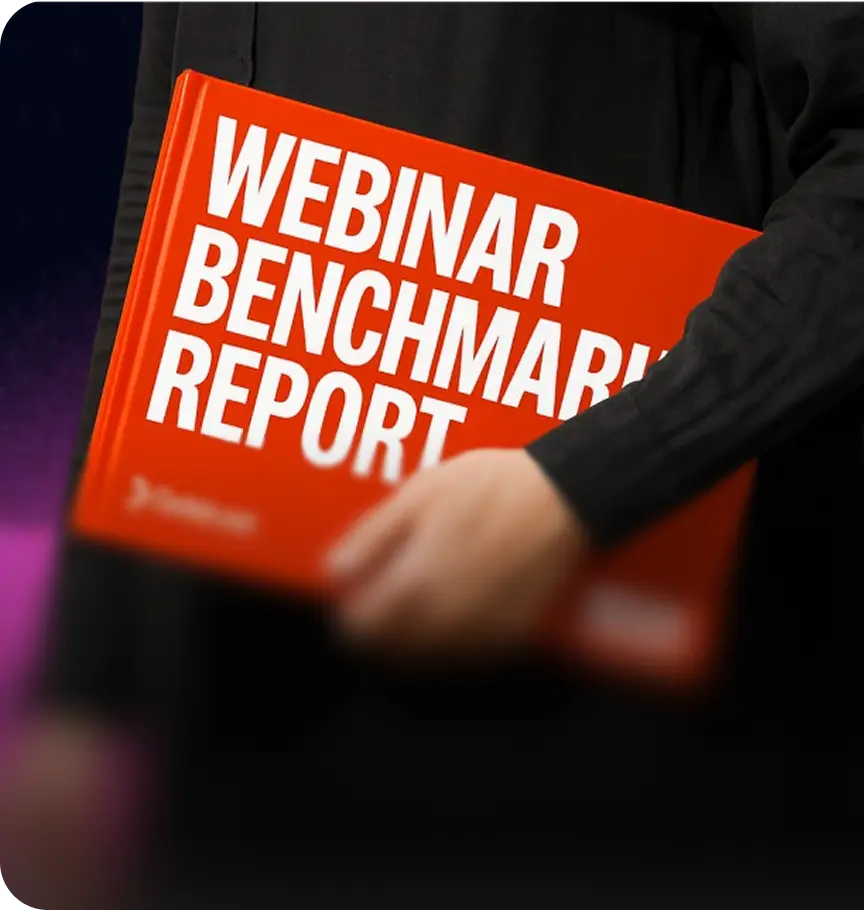Creating Lightning-Bolt Moments for Attendees: How To Use Webinars Within Integrated Marketing Campaigns

Maximize Your Marketing ROI
Join 10,000 other marketers already getting the best tips on running engaging events that boost pipeline and create raving fans.
The days of “one and done” webinars are well behind us. Today's B2B marketers are smart to think of webinars as just a single (albeit powerful!) part of a broader integrated campaign.
Whether you're aiming for demand gen, want to drive adoption toward a new product, or have another goal in mind, webinars can accelerate your campaign success. Let's talk about how to make that happen!
Today, we'll cover:
- Make your webinars a lightning-bolt moment within a broader integrated campaign
- Webinars can support a spectrum of campaigns
- Best practices for campaign success
- Actionable tips to make your webinar more campaign-centric and attendee-friendly
- Integrated webinar campaign examples
- Integration is integral to your future campaign success
To catch up on the full session from Day 1 of our Webinar Week series, click below! ⤵️
✨ Psst:You can unlock all of our Webinar Week content on-demand here!
Make your webinars a lightning-bolt moment within a broader integrated campaign
Again, when you're thinking of your marketing campaign, your webinar or digital event is just one piece of it—but the important thing is that it's all connected across the entire campaign.
Running events "just because" doesn't make sense. You must have a strategy! And we know that most of you already know that because almost 70% of attendees told us their webinars are at least somewhat integrated.
And if you're trying to get there but not quite sure how, we'll walk through all of that today!
At Goldcast, we look at integrated campaigns from a birds-eye view, crafting our campaigns around the webinar as the major marketing moment—the lightning bolt of the marketing journey, if you will.
As you can see, you start by teasing your content and trying to build hype around it with marketing assets like blogs, emails, and more. We call this "breadcrumb marketing" because you're dropping little nuggets that hint toward the value attendees will get by showing up to your event.
Eventually, lightning strikes, and your webinar takes place!
Afterward, you begin targeted response efforts. You want to drive things home and continue the conversation with folks, whether that's through sales outreach, email, or other ways. This is also the time when you'll repurpose your event into other forms of content, like quotes and social media posts.
Integrated marketing campaigns aren't just a good idea—they're the foundation for allowing your B2B marketing team to execute and scale profitable activity. Without integration, you end up with a bunch of fragmented marketing assets working in silos and an impossible-to-measure ROI.
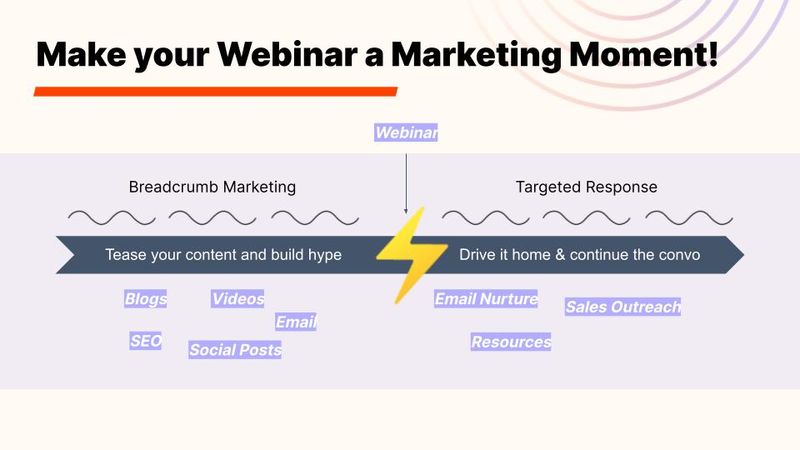
Webinars can support a spectrum of campaigns
No matter what your goals are, webinars can help.
On the demand generation side—which most marketers use webinars for—events can help you with qualifying leads and either accelerate open opportunities or create new ones. You might even use platform integrations to track interactions and use lead scoring in your demand gen efforts.
As you can see above, you can also think far beyond demand gen! Webinars can absolutely drive product adoption, customer retention, expansion, and serve your partner marketing purposes.
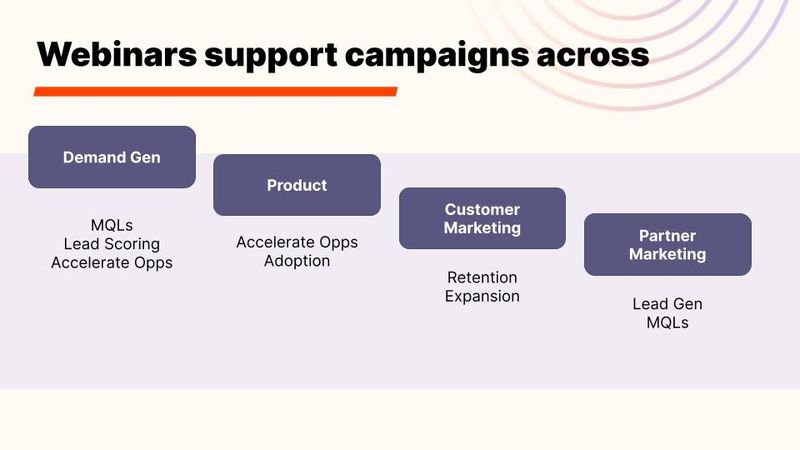
Best practices for campaign success
Now that you understand why integrated campaigns are a must, let's dive into specific ways you can ensure your campaign is on track.
Focus on your campaign theme before your webinar details
To start, identify your campaign theme before you begin the finer details of event planning. Your theme will help you get clarity on a lot of those event details. When you do things the other way around—hammering out your event abstract and then working backwards to see how it fits within the campaign—you're setting yourself up for frustration and double work.
Your theme also allows you to easily repurpose your event content and continue sharing consistent messages. Taking care of this step allows you to work smarter, not harder, which is always a good thing!
Outline and prioritize campaign objectives
Next, get clear on your campaign objectives. What's top priority for you here? Be honest with yourself: Are all of the objectives you've laid out reasonable and achievable? This step might also be critical in securing stakeholder buy-in before you have the green light to move on and continue investing in this specific campaign.
Set short-term and long-term goals
Every event should have goals, and you'll want to look at both short- and long-term aspirations. The goals that make sense for your event will depend on what type of event it is and who it's for.
For example, solutions that have a longer sales cycle should have goals that reflect that. Or, if you're trying for a more nebulous goal like influenced pipeline versus more straightforward conversion-related goals, that's something to consider.
No matter what goals you set, make sure your entire organization is on the same page about what they mean and why they're important. This will drive the direction you move in as you create not just your event but supporting assets for your campaign.
Have a tactical plan that maps to each goal
Once you have your goals in hand, make sure they're mapped out to a fully-fledged tactical plan. This helps you, once again, check to verify that all of your campaign planning actually supports the objectives you're trying to achieve.
Work in tandem with product and sales
Finally, make a concerted effort to align your product and sales teams. Here at Goldcast, we started out super fragmented and we've found that making sure our Product Marketing and Sales teams are BFFs is the only way to successfully move forward. If we aren't in lockstep with them, our campaign efforts can be a bit disjointed, which obviously affects ROI.
Actionable tips to make your webinars more campaign-centric and attendee-friendly
At this point, you may be wondering, "So do I need to do anything special for webinars that are part of a marketing campaign?"
The answer is, "That depends!"
What we mean by that is: It depends on what you're currently doing for your webinars. If you're already on top of, say, branding, you probably don't need to change a whole lot when it comes to your campaign webinars.
The following are some things we recommend to make your webinars feel like a cohesive component of your campaign.
Customized branding
This one's super important! You want your webinar to immediately appeal to people as part of your brand and campaign. You can use design psychology here to really help target audiences make the connection between the breadcrumbs you've already dropped and then that big, lightning-strike moment (aka your webinar!).
You're basically inviting people into your digital "home"—so be sure it's tidy, organized, and ready for their arrival!
Content hubs
Content hubs serve as a one-stop shop for attendees to recap on what was discussed during the event and learn more.
Having all of your resources in one accessible place:
- Lets attendees connect the dots between what they learned and what they still want to know
- Takes some of the work off of your team because they'll have less questions to field
- Allows you to track valuable data about what people are clicking on and wanting to learn more about.
Accessibility
If you're running a global marketing campaign, accessibility features can make your job a whole lot easier—and you're adding value for your audience, too!
For example, within Goldcast, we've got a "CC" button you can click on that provides a live captioning of the event you're in. The captioning can be translated into many different languages, including Italian, Spanish, Korean, Japanese, Dutch, and more. (And it works on-demand as well!)
This is huge. Rather than splitting up your audience into five different events, you can do one event for five different countries and allow everyone to gather together and share information and insights.
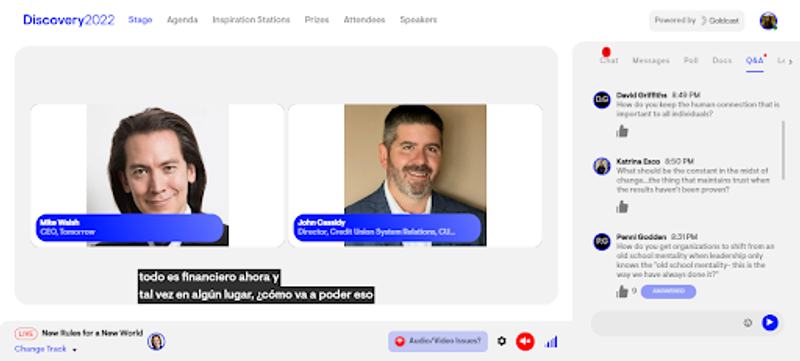
Integrated webinar campaign examples
We know there's nothing like real-world examples to inspire you, so here are some straight from the Goldcast archives! Read on to learn about each campaign and the assets we created to support it.
Remember the journey we talked about earlier: each campaign began with breadcrumb marketing, culminated in a lightning-bolt moment at the webinar itself, and then we followed up after to keep the momentum going.
Event Marketers' Path to Leadership
In this webinar series, we wanted to showcase how event professionals can map out their careers to land in the C-suite. We outlined several paths for event marketers, including event leadership. We also conducted interviews with former event marketers who pivoted and now occupy leadership roles.
Here's what that campaign looked like in action:
- A webinar series featuring leading experts
- We used this series as a chance to cross-promote our earlier campaign around the 2023 Event Marketing Compensation report
- A gated e-book in which we transformed interviews, quotes, and clips into a longform resource
- We repurposed each event session into its own blog post: see here and here for examples!
And here's a couple of promo examples from our email and social campaigns:
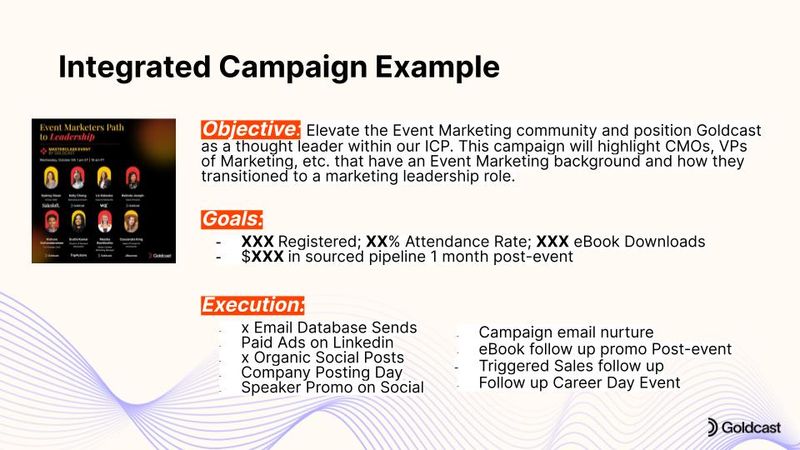
Webinar Week
Webinar Week was an ambitious project. We did five webinars in as many days and gave attendees an exclusive, behind-the-scenes look at our own webinar strategy.
For this campaign, we created:
- The webinar series itself (which, like all of our webinars, is hosted on-demand now)
- A super valuable, data-driven benchmark report on webinar performance. We used Goldcast platform data to build the report and then went back after the webinar series finished to update it with relevant quotes and tips from the series. The CTA at the end of this eBook drives people to the Webinar Week content in case they haven't watched it.
- Supporting blogs: So far, we've crafted more than 15 posts from the webinar series!
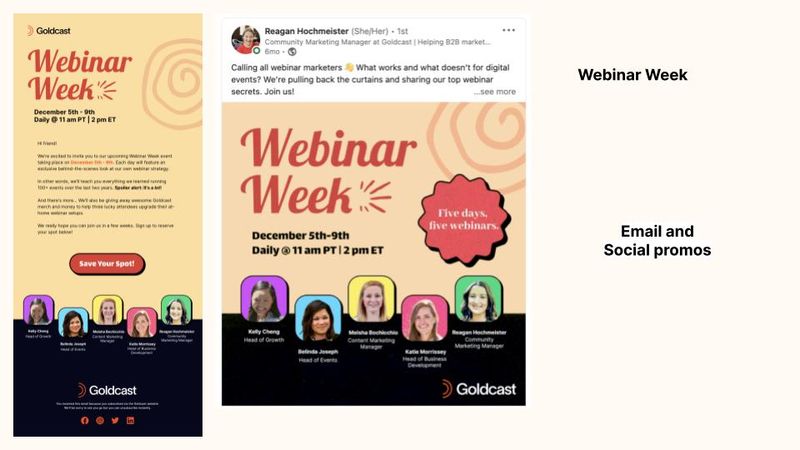
Attendee Sentiment Report
We surveyed 500+ B2B marketers to find out what people really want out of events this year and beyond. Then, we put that together in our first-ever Attendee Sentiment Report.
That campaign included:
- The 2023 Attendee Sentiment Report
- A webinar in which we shared details about the report and, along with some key partners, discussed how modern B2B brands are leveraging events as a top pipeline generator
- Supporting blogs diving into key report themes like maximizing the value of on-demand content and how to run hybrid events
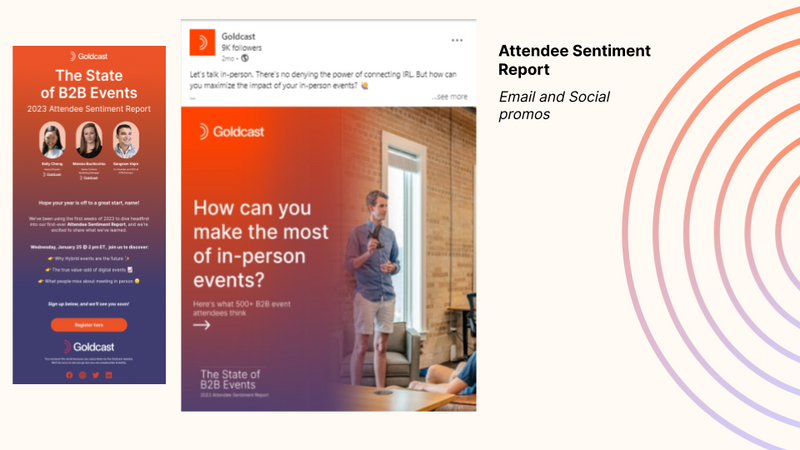
Integration is integral to your future campaign success
Sure, it takes more time on the front end to get clear on your campaign goals and then develop your webinar and other marketing content around it—but the payoff is well worth it! You'll host more meaningful events, foster valuable relationships with attendees, and continue to position your brand as an expert in your industry.

Transform Your Video Marketing with AI
Stay In Touch
Platform
Resources
© 2026 Copyright Goldcast, Inc. All rights reserved.



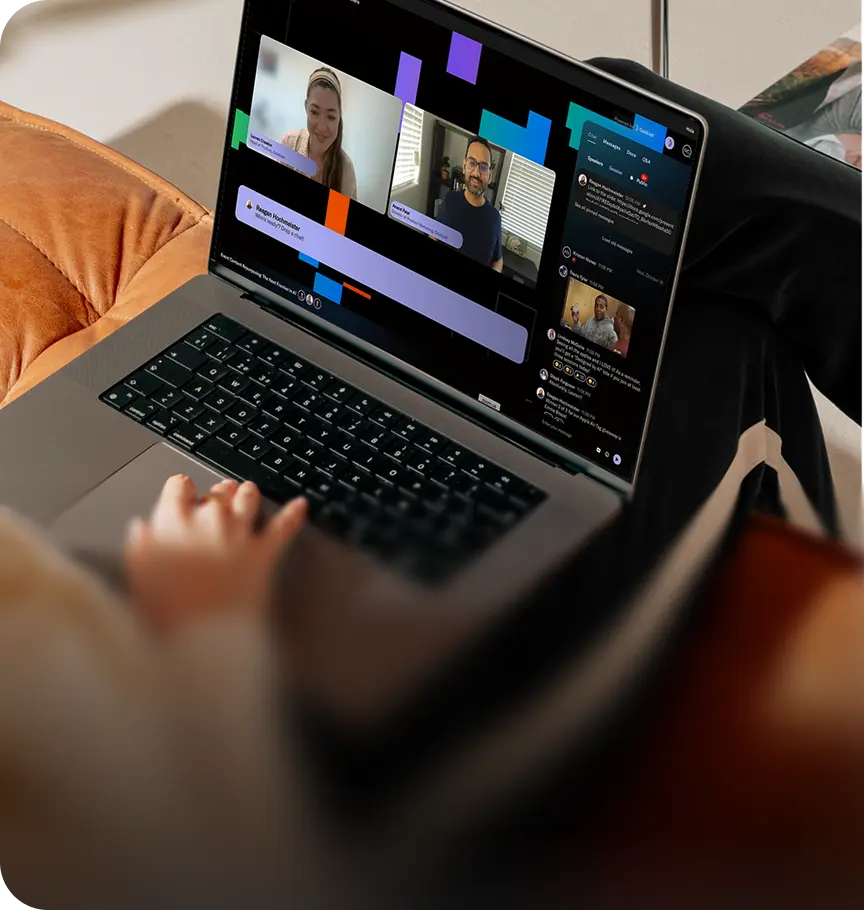

 Upcoming Events
Upcoming Events Event Series
Event Series On-Demand Events
On-Demand Events